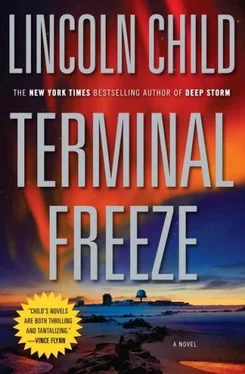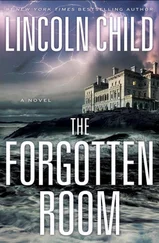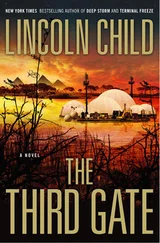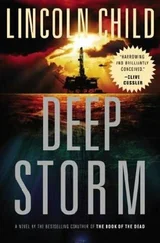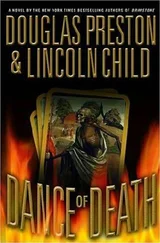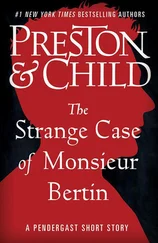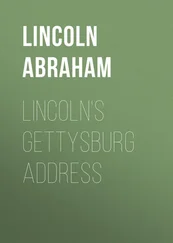“Okay,” he muttered. “We’ll take up position outside the staging room. Phillips, you do a quick recon.”
Phillips, who was on point, gave a thumbs-up. Gonzalez glanced back at Marcelin, who nodded his understanding.
Privately, Gonzalez was relieved at how Marcelin was holding up. He was the only one to catch a glimpse of the creature, and it had almost unmanned him. But either he’d rallied or he was putting up a good front. A rotation like this, stuck in the ass end of nowhere, didn’t generally pull the cream of the crop, but he was pleased with his present team. True, they were “camp slugs,” engineer corpsmen without combat experience under their belts. But they weren’t whiners and they weren’t prima donnas. They understood that every day at Fear Base would be just like every other day.
That is, until now.
Gonzalez looked over Marcelin’s shoulder at Creel. The burly foreman was grinning like an idiot, two handguns jammed in his waistband, brandishing his M4 grenade launcher-equipped carbine like he was goddamned Rambo. Creel was a wild card: Gonzalez was a little skeptical about the Third Cav claims but at least the man knew how to handle a weapon. And though three machine guns seemed like plenty, Sergeant Gonzalez was a conservative man. An extra trigger finger felt like a good precaution.
He’d considered calling this one in and waiting for orders. But waiting for a reply to filter through the chain of command would have taken hours, maybe longer, and Gonzalez was in no mood to wait. Besides, he didn’t particularly relish trying to explain what it was, precisely, they were after. There had been three deaths already on his watch, and he’d been given broad discretion at this far remove from authority. Better to let the bullet-riddled corpse provide its own explanations.
The powerhouse staging room lay directly ahead now. In the dim light of the corridor, Gonzalez saw the door yawning open, hanging at a crazy angle on twisted hinges. “Remember,” he told Phillips. “Low and slow.”
“Yes, sir.” The private unshipped his M16. Weapon at the ready, he drew himself up to the doorframe, slipped around it. Ten seconds later he gave the all clear.
Gonzalez motioned the others to step inside, then he followed. The room was as they’d left it: a hurricane of bloodstains, looping in fantastic arcs and jets across the floor and the footings of the step-down transformers. They had managed to close the access panel to the maintenance crawl space, but the room was still uncomfortably cold.
He glanced at Marcelin. The corporal was studiously averting his eyes from the bloodstains. He looked a little green about the gills.
“Corporal?” Gonzalez spoke over the hum of the transformers.
Marcelin’s eyes darted toward him. “Sir?”
“You okay?”
“Yes, sir.”
Gonzalez nodded and turned his gaze once more toward the rivers and tributaries of blood. Dozens of bloody footprints traced desperate lines, testament to the frantic activity that had taken place here shortly before. Some of them led into the corridor and back in the direction they’d come from, toward the infirmary. But there was another set of prints-if you could call them prints-that led off in the other direction, deeper into the base. Pulling his flashlight from his service belt, he snapped it on and examined them. They were huge, distorted rosettes. Recurved hooks, long and cruel-looking, sprouted from the front of each rosette.
He stared a long time.
Gonzalez considered himself a simple man, a man with few needs and fewer pretensions. He had never had much use for the company of others, and the only kind of pride he knew was the pride of doing a good job. That was why he’d never sought out promotion; why he’d never felt any strong desire to advance beyond the rank of sergeant. Sergeant, he felt, was his ideal niche: high enough to impose his own small vision of order on things, but not so high as to court unwanted responsibility. It was also why he was the only soldier to have remained longer than eighteen months at Fear Base. The fact was, he’d been here now almost thirty years. He would never forget the look on the face of the major at Fort McNair when, returning from a furlough after his first tour at Fear Base, Gonzalez asked to be posted there again. He could have retired years ago, but he couldn’t imagine doing anything else other than making sure this installation, mothballed and forgotten, was well cared for. He had no family and few possessions beyond a Bible and the tall stack of mystery novels he read over and over again in the evenings, alphabetically by title. He’d spent so much time in the company of his own thoughts that it had become the company he most preferred. It was a simple existence but well-ordered, rational, predictable-just the way he liked it.
Which was why the bloody print now illuminated in the flashlight beam gave him such a disagreeable feeling of unease.
His thoughts were interrupted by Creel snugging a grenade into the under-barrel launcher of his M4. “You know, my uncle won an African safari once,” he said. “No kidding. First prize in an Elks raffle. Bagged a cape buffalo on it. Boy, he boasted about that damn hunt for years.”
This is one hunt you won’t ever be allowed to brag about, Gonzalez thought. He glanced at his men. Phillips was shining his light over the floor and walls, spatters of blood appearing and disappearing as the beam traveled. Marcelin was standing in the doorway, looking out into the corridor, head cocked as if listening.
“We ready?” Gonzalez asked quietly.
“Hell, yes, we’re ready,” Creel said. “Let’s take this thing down.”
They regrouped just inside the doorway, then moved into the hall. Phillips once again took point, supplementing the faint corridor illumination with slow sweeps of his flashlight, following the bloody, disquietingly large prints. There seemed to be occasional droplets of blood on the floor here, too-drops that had nothing to do with the tracks. Had the creature been wounded somehow?
“Jesus,” he heard Phillips say. “What the hell kind of prints are those?”
The hall dead-ended at an intersection. To the left lay a series of unused and empty offices; to the right, the corridor led to the radar-support spaces. They paused while Phillips carefully shone his light around. The prints were growing less distinct, the droplets of blood less frequent, but they clearly led to the right.
Gonzalez felt his heart sink. The radar-support spaces were a warren of small, equipment-heavy galleries and storage nooks. If the thing was in there, it would be a bitch to flush it out.
“Let’s go,” he said. “Weapons at the ready. Don’t speak unless it’s absolutely necessary.”
He looked at them in turn, lingering briefly on Marcelin. The greenish cast had left the corporal’s face, to be replaced by pallid anxiety.
As they moved forward again, Gonzalez took a quick mental inventory of his own emotions. He realized that he, too, was afraid. Not of being killed or injured-their overwhelming firepower would protect them from that-but of the unknowns this thing they were tracking represented. He remembered the photographer, Toussaint: the way he had raved, shrill and loud and with hardly a break for breath, until sedated. He recalled the panicky edge to Marcelin’s voice, back in the mess. Don’t make me say it…! Gonzalez was simply too old, too set in his ways, to have his understanding of the natural world roughly unseated.
The corridor was a receding rectangle of black, punctuated by pools of yellow light. Phillips kept his flashlight on the tracks while the others licked theirs left and right in loose, unchoreographed patterns. They passed the stairwell leading to C Level and the enlisted men’s quarters, then the set of rooms used for data acquisition and identification. All four doors were closed and showed no signs of tampering, their small metal-grilled windows undamaged.
Читать дальше
